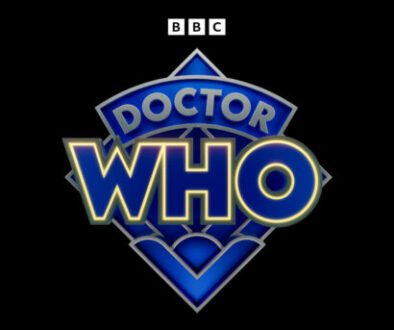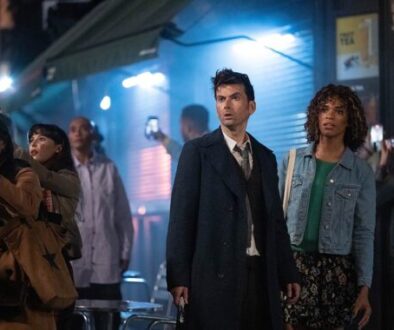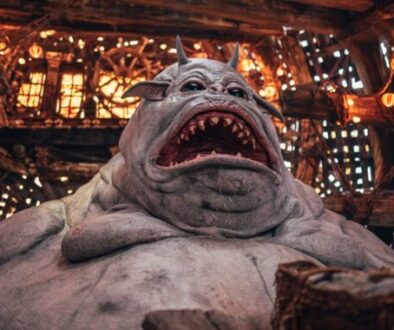2nd Opinion, Take 1 “The Star Beast” – Hits and Misses

Gustaff Behr reviews the first 60th anniversary special.
Ladies and gentlemen, we’re finally back! “The Star Beast” hit the screens after a year, a month, and two days since the last television episode, marking the longest gap between consecutive stories since the show’s return. Russell T Davies has promised a monumental 3-part 60th Anniversary event, and the time has come to see what he’s crafted…
Unfortunately, this first episode was a bit of a hit-and-miss for me, primarily due to certain script choices. For starters, it hasn’t been over a decade since I last experienced David Tennant as the Doctor. Having ‘seen’ him in seven Big Finish productions since “The Power of the Doctor”, I must admit that I would rate all but one of those higher than “The Star Beast.” Nonetheless, it’s undeniably wonderful to see David back in action. From the moment he steps out of the TARDIS, he steals the spotlight. The new attire suits Fourteen perfectly, and I couldn’t help but be awestruck watching him deftly sneak around, reminiscent of the early parts of “Partners in Crime.”
What took me by surprise was how swiftly the story kicked off. There’s no gradual build-up of the plot or stakes; we are thrust right into the action from the get-go. With the episode clocking in at just under an hour, this allowed for ample exploration of the Doctor/Donna relationship. The set designs appear grander and more extravagant than those in Series 13, but if there’s one thing I’ve missed, it’s Murray Gold. Kudos to him for taking me back to the golden years of the show. While there are a couple of familiar tracks in this episode, slightly updated or modified, I could recognize “The Doctor’s Theme” and “A Noble Girl About Town” from anywhere.

I was pleasantly impressed by the new TARDIS design. Luckily, I managed to avoid all spoilers on the subject, so my excitement matched the Doctor’s when I first laid eyes on it. This version might just be the most spacey incarnation yet, and the sheer size and flashing round thingies truly give the console that extra oomph. It’s a significant improvement over its dark and cramped, crystal predecessor.
I had also forgotten how funny Russell T Davies’ scripts could be. The Doctor’s interaction with Shaun in the taxi was downright hilarious; the almost literal sixty-second foreshadowing of Donna spilling her coffee after telling the Doctor how she lost her day job, and Beep’s rebuttal to Rose’s speech-policing attempt, identifying as the ‘definitive article,’ brought a smile to my face. And, of course, the Psychic Paper still not being updated on the Doctor’s regeneration.
Balancing these comedic moments are some really brilliant character developments. The subplot about the Doctor needing to understand why Donna would give away all her money, Donna’s anxieties over her lost time, and Rose’s identity struggles, coupled with a new interpretation of Donna’s relationship with Sylvia, all contribute wonderfully to the storyline. However, Fourteen reminiscing about Wilf, believing he’s passed on, would have tugged at my heartstrings more if I hadn’t spotted Bernard Cribbins in the filming leaks. It does make me wonder, though: If the Nobles are having a tough time maintaining the expensive house, why not just sell it (maybe to UNIT) and buy a less expensive one without any stairs? Was it simply lazy writing not to have Wilf in the episode? Most likely.

I’ll be honest; I was initially on the fence about undoing Donna’s brilliant and emotional memory wipe to justify these three Series 4 nostalgia events. However, the way it was handled—I enjoyed it. Donna giving away her money, being forced back into poverty, experiencing bouts of depression and self-doubt over a period of her life she can’t remember, with Sylvia Noble compelled to gaslight her daughter’s anxieties to protect her from potentially dying—in my opinion, it’s a fair trade-off, and it leads to a profoundly emotional scene when Fourteen and Donna find themselves separated by a plate of glass. The scene resonates with echoes of “The End of Time” and “The Fires of Pompeii,” but it plays out more like the Bucky Barnes deprogramming scenes from the MCU. Kudos for ending it with the word ‘binary.’
The episode does have its shortcomings, and there were more than a few instances where it dropped the ball.
Firstly, the prolonged minute and a half of exposition before the opening titles was a bit much. A ‘Previously on’ segment could have sufficed, or they could have taken a cleverer and cheekier approach, à la Steven Moffat’s style in “Twice Upon a Time.”
The character of Shaun Temple was somewhat disappointing too. Similar to the UNIT Scientific Advisor Lady, these characters felt more like plot devices than fully developed characters. Much like several plot points, they exist because the script says they do. It also doesn’t help that Ruth Madeley is simply playing Hebe Harrison from Big Finish, but onscreen. Was Ingrid Oliver unavailable for filming? Osgood is already a fan favorite and Kate’s coming back anyway, so…?
The newfound ability of the sonic screwdriver to create light barrier shields was a bit perplexing, and it’s likely that this feature won’t make a return outside this episode. Also, the convenient act of Beep the Meep’s spaceship gluing London back together before the creature’s defeat raised my eyebrows. Spaceships apparently have buttons for that kind of thing?

However, the most glaring misstep was Donna’s ‘you wouldn’t understand because you’re a man, you dumbo’ moment. In an episode that aims to preach the message that ‘gender does NOT matter,’ it paradoxically hinges on a gender-specific solution. This not only makes the Doctor’s understanding contingent on gender but also renders the initial preaching about gender irrelevant.
So why even bother preaching in the first place?
The comment about the Doctor probably understanding if he were still a woman comes off as not just rude, but also sexist. The episode misses a significant opportunity to solve the problem in the most Donna way possible—by pointing out that the Doctor couldn’t solve the Meta-Crisis problem because he approached it as a Time Lord, not a human.
… Remember the Sontaran two-parter in Series 4?
Donna’s solution: Check the Sick Days register.
Utterly genius, out-of-the-box thinking. It would make so much narrative sense, since the only reason Donna couldn’t come up with a solution in “Journey’s End” was because there wasn’t any time to. Here, there is a lot of it. Honestly, writers need to start realizing that ‘woman saying men can’t do a thing’ is basically just a trope now.
Finally, as someone who has been consistently following Doctor Who and regularly enjoys what I consider great stories in audio format, it’s difficult to sway me with Expectation or Confirmation Bias. This episode felt like a typical installment from the Russell T Davies era, designed to tap into the nostalgia fans have for what many consider the golden period of the show. Hopefully, next week sees Russell delivering on what has been described as a Doctor Who script that has never been done before. You have my attention now, Mr. Davies. Let’s see what you do with it.








